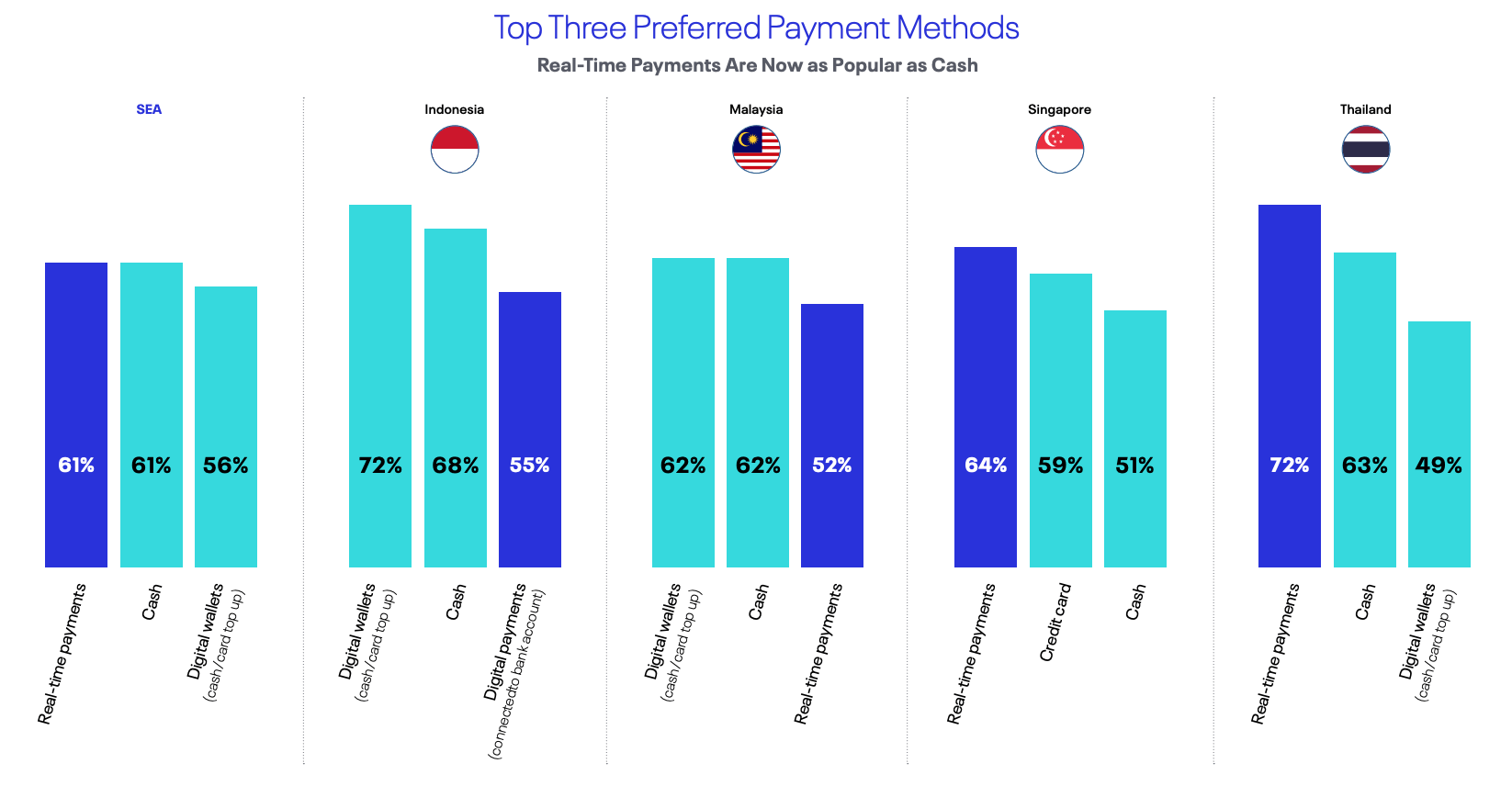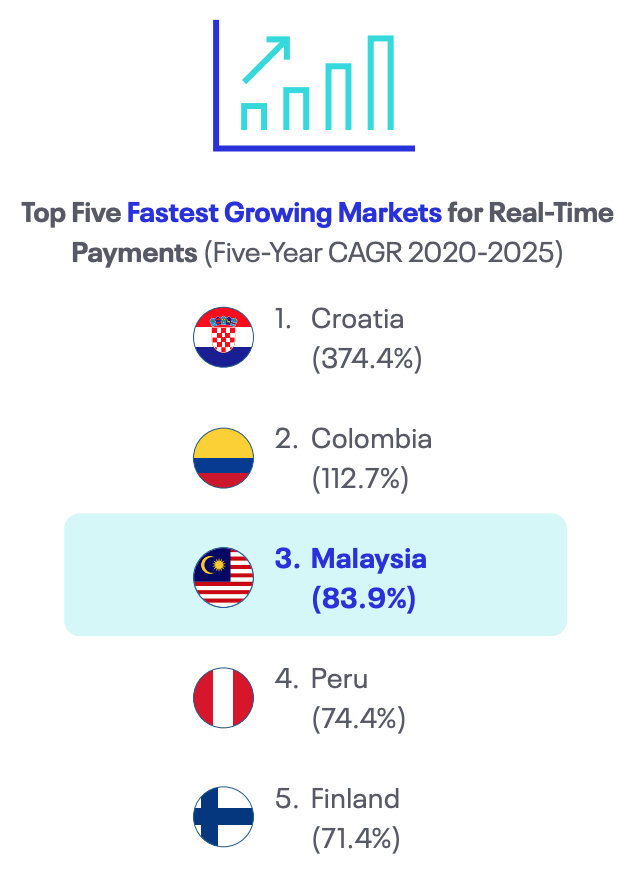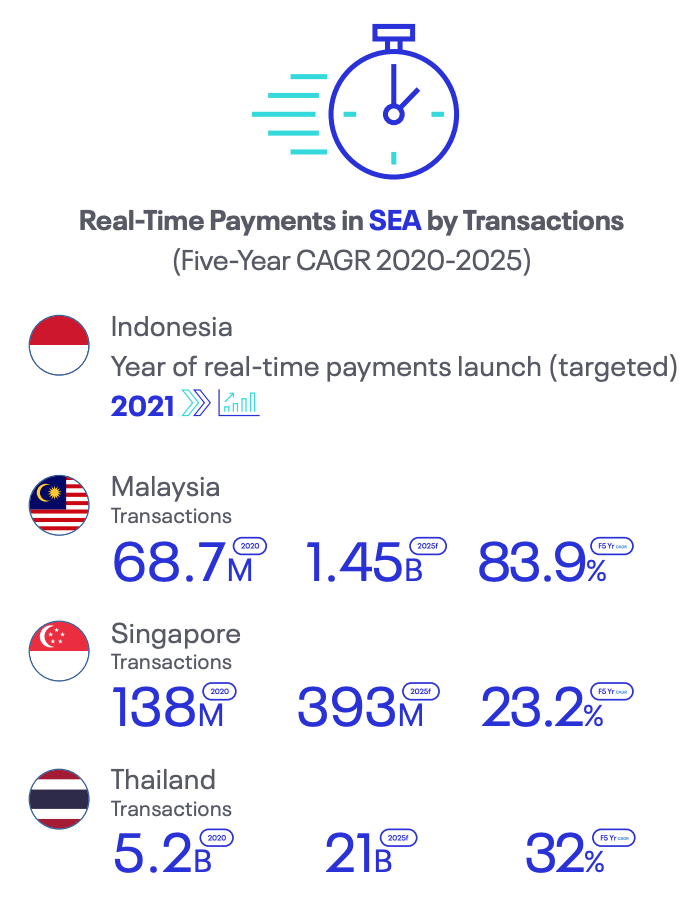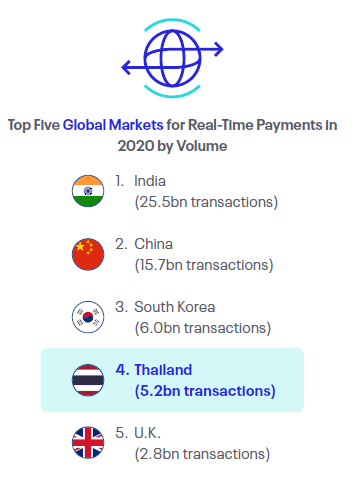In Southeast Asia, real-time payment schemes are entering the mainstream with many consumers now favoring the payment option over cash, a shift caused by changing payment necessities and preferences amid the COVID-19 pandemic, a new research by industry player ACI Worldwide and market research firm YouGov found.
Out of 6,000 consumers surveyed across Indonesia, Thailand, Singapore and Malaysia, 61% selected real-time digital payment schemes as their preferred way to pay in 2021 – neck and neck with cash, and higher than digital wallets requiring cash or card top-ups (56%) and credit cards (30%).
Thailand and Singapore are the biggest adopters of real-time digital payment, with 72% and 64% of respondents, respectively, favoring the payment method.

Top three preferred payment methods in key Southeast Asian markets, Source: Real-Time Goes Mainstream, ACI Worldwide, 2021
This represents a radical shift in Southeast Asia where cash has long remained king. In the Philippines and Vietnam, cash transactions account for 37% and 26% of all transactions, respectively – the highest levels in Southeast Asia, according to data from Merchant Machine.
Thailand, Indonesia and Malaysia have lower cash usage, which makes up for 16%, 13% and 11% of all transactions, respectively. Unsurprisingly, Singapore has the lowest cash usage which account for just 2% of all transactions.
The accelerated movement towards real-time digital payments comes on the back of rapid technological change and evolving consumer expectations. In the region’s six largest economies, 70% of the population is now online, with 40 million connecting to the Internet for the first time in 2020. More than one in three consumers in Southeast Asia has started using a new type of online service due to COVID-19, and nine out of 10 plan to keep using at least one such digital service post-COVID-19, the research found.
Real-time digital payment growth trends
Over the next years, real-time payment transaction volumes are projected to grow significantly. Malaysia is set to lead the pack with an estimated five-year compound annual growth rate of 83.9%, soaring from 68.7 million transactions in 2020 to 1.45 billion by 2025, the research found.
These projections would make Malaysia the third fastest-growing market for real-time digital payments in the world, behind Croatia (374.4%) and Colombia (112.7%).

Top Five Fastest Growing Markets for Real-Time Payments (Five-Year CAGR 2020-2025), Source: Real-Time Goes Mainstream, ACI Worldwide, 2021
Thailand, which already stands as the fourth largest market for real-time digital payments in the world, recording 5.2 billion transactions in 2020, is expected to see volumes surge 32% to 31 billion. Meanwhile, Singapore should see a 23.3% increase in real-time digital transaction volume to reach 393 million by 2025.

Real-Time Payments in SEA by Transactions (Five-Year CAGR 2020-2025), Source: Real-Time Goes Mainstream, ACI Worldwide, 2021
Out of the five biggest real-time digital payment markets in the world in 2020, four are in Asia, showcasing how the region has been a trailblazer in real-time payments and how payment modernization efforts have paid off. In addition to Thailand, these are India (25.5 billion transactions), China (15.7 billion) and South Korea (6 billion).

Top Five Global Markets for Real-Time Payments in 2020 by Volume, Source: Real-Time Goes Mainstream, ACI Worldwide, 2021
Real-time payment schemes in Southeast Asia
In the region, Singapore was the first country to launch a real-time payment scheme, introducing in 2014 Fast and Secure Transfers (FAST). FAST enables retail and corporate customers of participating banks to transfer funds 24/7/365 and can be accessed via banks’ Internet banking services.
In 2017, a second scheme called PayNow was launched to consumer. Built on FAST, PayNow is a peer-to-peer (P2P) instant fund transfer services that allows users to transfer funds from one bank account to another using proxy options like a mobile phone number or a national identity (ID) card number.
Thailand rolled out its real-time payment system PromptPay in 2017. Like PayNow, PromptPay allows users to receive and transfer funds using just a national ID number or a phone number. Part of Thailand’s National e-Payment initiative, the service was first designed to deliver government welfare disbursements.
This year, Singapore and Thailand linked their two real-time payment systems to allow fast and seamless cross-border payments.
Finally, Malaysia launched its real-time payment network DuitNow in 2018, which allows users to transfer funds instantly using a mobile number or an ID number. DuitNow began linking with Thailand’s PromptPay system in June 2021, enabling cross-border QR payments between users in the two countries.
Meanwhile, Bank Indonesia launched the Quick Response Indonesia Standard (QRIS) in 2019, establishing uniform QR code standards for mobile payments. Indonesia’s BI-FAST real-time payment system is currently in the development stage with individual credit transfer services scheduled for the end of 2021.







